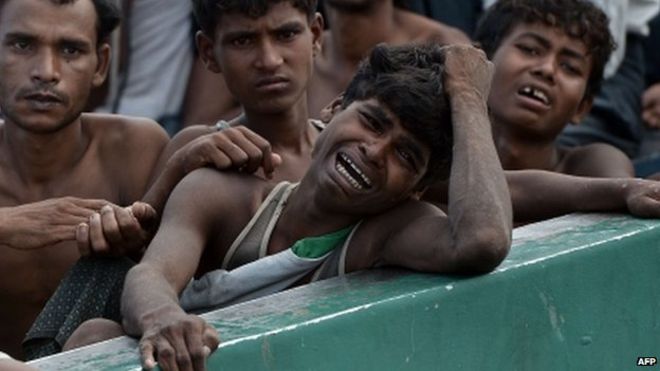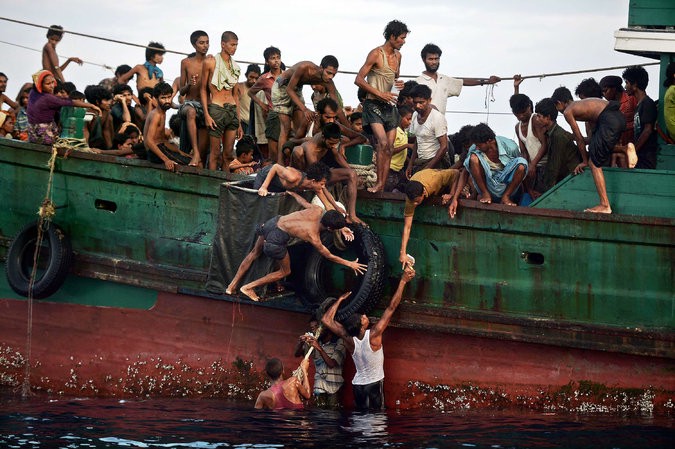The Rohingya are Muslims that come from Myanmar (formerly Burma). They are thought to be descended from Muslim traders who settled there more than 1,000 years ago into Myanmar.
For a number of years now, they have been facing oppression to its utmost degree, never has a human being in the modern ages been maltreated this way. In their own country, Myanmar, they are subjected to forced labour, have no land rights, and are heavily restricted.
Their estimated population in Myanmar alone is 800,000. They are unwanted and driven out of Myanmar by its government and are no longer citizens of Myanmar. Instead, they are required to carry white cards “temporary registration certificates” and they no longer have the right to vote in upcoming elections.
When did the oppression begin?
The oppression began decades ago. For example, under the 1982 Citizenship Law, the Myanmar authorities do not recognize the Rohingya, classing them as Bengali and illegal immigrants from Bangladesh.
In June and October 2012, there were large scale attacks on Rohingyas in Rakhine State. The attacks started the 2012 Rakhine State riots, where at least 100,000 were displaced, more than a 100 killed, and 3,000 houses destroyed.
Before the riots, there were widespread and strongly held fears circulating among Buddhist Rakhines that they would soon become a minority in their ancestral state, so the cleansing began.
Dr. Habib Siddiqui in Kaladan News stated that “Through a calculated policy of starvation, forced poverty, denial of all the basic rights (enshrined in the Universal Declaration of Human Rights) of the Rohingya people and inaccessibility of humanitarian aids reaching them, the Myanmar government is guilty of scripting the Rohingya genocide. It is creating forced exodus and bringing in slow death of the Rohingya people.”
Where will the Rohingya people go?

The Exodus has already started. As many as 8,000 migrants from Bangladesh and Myanmar are believed by the International Organization for Migration (IOM) to be stranded at sea at this moment. Neighboring countries are refusing to accept illegal immigrants. For example, Malaysia, a neighboring Muslim state, has made it clear that it will not accept boatloads of migrants and has ordered its navy to repel them. Meanwhile, Indonesia, like Malaysia, has made it clear that the Rohingyas are not welcome, with its navy turning away boatloads of migrants.
In conclusion, these Muslim states have turned their back on the Rohingya. They have not only turned their back on people they share the same faith with, but they have also turned their back on humanity as a whole.
Should the Rohingya stay and suffer more oppression and wait untill they are exterminated, or leave the God forsaken country and look for an honorable life elsewhere? But even when they try to leave, they are denied.






Comments (15)
The “Rohingya” are not descended from “Muslim traders” who arrived 1,000 years ago. The Muslim traders who arrived 1,000 years ago were mainly Persians and Arabs who became ancestors of the Burmese Muslims of today (mixed with locals). Do the Rohingya look Persian? They are descended from Chittagonian immigrants who arrived in British times (1900-1940) as poor farm workers. There has been violence between these Chittagonian immigrants and their descendants and the local Arakanese (Rakhine) people since around 1930 and especially during WW2. In the 1950s the Chittagonians launched an insurgency that took over part of Rakhine for about 5 years. In 2012 violence between the two groups killed hundreds (about 60% Chittagonian but also about 40% Arakanese). The Chittagonians (“Rohingya”) fled several towns and were placed in refugees camps where they receive international aid.
This is so sad 🙁 may God have mercy on human souls that neglect one another like this, regardless of creed, color, or political opinion.